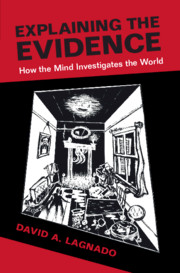Book contents
- Explaining the Evidence
- Explaining the Evidence
- Copyright page
- Dedication
- Contents
- Figures
- Tables
- Preface
- Acknowledgements
- Chapter 1 The Cliff Death
- Chapter 2 Models in Mind
- Chapter 3 Causal Modelling
- Chapter 4 Thinking beyond Biases
- Chapter 5 Expert Reasoning in Crime Investigation
- Chapter 6 Questions of Evidence
- Chapter 7 Competing Causes
- Chapter 8 Confirmation Bias
- Chapter 9 Telling Stories
- Chapter 10 Idioms for Legal Reasoning
- Chapter 11 Causal Reasoning in a Time of Crisis
- References
- Index
Chapter 11 - Causal Reasoning in a Time of Crisis
Published online by Cambridge University Press: 20 October 2021
- Explaining the Evidence
- Explaining the Evidence
- Copyright page
- Dedication
- Contents
- Figures
- Tables
- Preface
- Acknowledgements
- Chapter 1 The Cliff Death
- Chapter 2 Models in Mind
- Chapter 3 Causal Modelling
- Chapter 4 Thinking beyond Biases
- Chapter 5 Expert Reasoning in Crime Investigation
- Chapter 6 Questions of Evidence
- Chapter 7 Competing Causes
- Chapter 8 Confirmation Bias
- Chapter 9 Telling Stories
- Chapter 10 Idioms for Legal Reasoning
- Chapter 11 Causal Reasoning in a Time of Crisis
- References
- Index
Summary
Chapter 11 aims to summarize the key messages in the book by applying them to our thinking during the coronavirus crisis. I show how many of the concepts – from psychology and formal modelling – recur in expert and lay reasoning during the pandemic. I argue that the danger of jumping to premature causal claims, without careful evidence evaluation, is particularly rife in situations of radical uncertainty. But causal thinking is also an essential tool for dealing with such crises.
Keywords
- Type
- Chapter
- Information
- Explaining the EvidenceHow the Mind Investigates the World, pp. 265 - 281Publisher: Cambridge University PressPrint publication year: 2021

